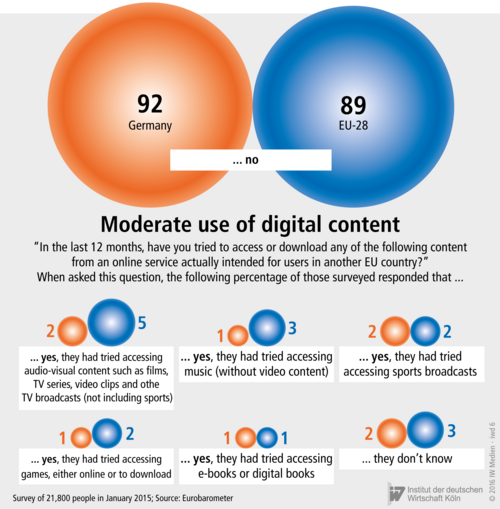In light of increasing digitalisation, the EU is facing a reform in the area of copyright protection. This is no simple matter. After all, each country has its own regulations in this area; and yet providers of texts, images, films, music and software have other interests than consumers do.
Copyright protection: National, global, digital
It is estimated that the cultural and creative branches across the EU employ more than 7 million people and that this segment, with revenues of some 550 billion euros, contributes approximately 4 per cent to the GDP (2014).
Today, digitalisation constitutes the fundamental problem of copyright protection. It enables users to copy texts and music and to distribute them quickly by way of the Internet – throughout the world, of course.
This raises a number of questions. For instance, what happens if a musician or publisher puts their work online, thus making it available to a global audience? Do copyright holders have to protect their rights in every country, or are they only protected by laws of the country in which they reside?
In order to address such problems, access to certain content from other countries is technically restricted by means of geo-blocking. This technology makes it possible, for instance, for certain live streams from the ARD media library to be accessed only within Germany, not from other countries.
On top of this, the providers and consumers of digital content hold different interests. While private users tend to resell software as “used”, this is precisely what the software manufacturers don’t want – since it causes them to lose business.
Despite the urgent need for a uniform and secure legal framework for EU countries, the European Parliament and European Commission are not placing a major emphasis on finding a new copyright law for consumers – at least not at the moment. After all, access to online content across national borders is still within moderate limits (see chart).
In the last 12 months, 89 per cent of Europeans and even 92 per cent of the German population reported having no interest in accessing online content that is primarily directed at users in another EU country.
However, there are considerable differences depending on age and the specific content. For instance, only 2 per cent of Germans access audio-visual content such as films, TV series or video clips, while the figure in Ireland has already reached 25 per cent. And in the EU, while 95 per cent of those aged 55 and over never access content across national borders, only 79 per cent of those between the age of 15 and 24 refrain from this practice.
The main reasons for this relatively low demand: 54 per cent of the surveyed Europeans indicated not having any interest in such content, and almost just as many responded that they already have enough content available in their own country.
But there are also technical issues. Some 27 per cent of the EU population reports having only limited access to a foreign website or being unable to download the content they want.
More on the topic
![[Translate to English:] Das Gebäude des Weißen Hauses in Washington, D.C. in den Vereinigten Staaten von Amerika. [Translate to English:] Das Gebäude des Weißen Hauses in Washington, D.C. in den Vereinigten Staaten von Amerika.](/fileadmin/_processed_/c/1/csm_GettyImages-2161499385_White_House_Editorial_884306add8.jpg)
Trump or Harris or ...? What Europe must prepare for
A few months before the presidential election in the USA, Donald Trump has a good chance of being re-elected. On the Democratic side, the incumbent president has withdrawn his candidacy after a long period of hesitation, while Vice President Kamala Harris is ...
IW
Compendium 5.5: CO2 Regulation of Road Transport in Europe
With the Compendium CO2 Regulation in Europe, the IW has been providing the interested public with a comprehensive collection of data on the development of CO2 emissions from passenger car traffic in the European Union, as well as on the applicable regulatory ...
IW
